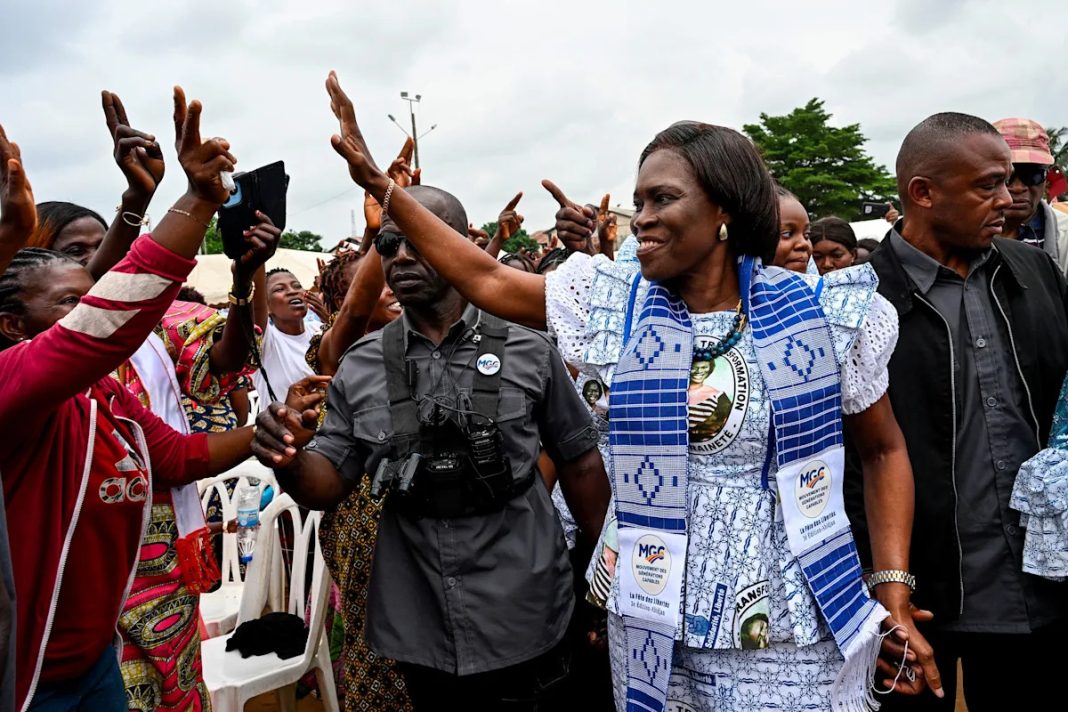The News
An unexpected thaw between Côte d’Ivoire’s ruling coalition and a key opposition movement has disrupted the country’s political landscape, three months ahead of closely-watched presidential elections, raising the prospect of prolonged instability in Francophone West Africa’s biggest economy.
Last Wednesday a delegation of government ministers paid a first-of-its-kind visit to former First Lady Simone Gbagbo, who on July 5 announced her candidacy for October’s presidential vote. The meeting in Abidjan came on the same day President Alassane Ouattara met French President Emanual Macron for an informal lunch in Paris, reportedly to discuss the upcoming elections. The presidential vote has raised global concern about fairness after leading opposition candidate Tidjane Thiam, the former CEO of Credit Suisse, was barred from running.
Ouattara, 83, has yet to say if he’ll seek a fourth five-year term — and even if he does, some doubt he could complete it. The resulting uncertainty has left the country’s political and business classes jockeying for influence in anticipation of a possible power vacuum.
Know More
The shifting alliances in Ivorian politics were underscored by the widely circulated images of Cissé Bacongo, minister-governor of Abidjan and secretary general of Ouattara’s ruling Rally of Houphouëtists for Democracy and Peace (RHDP) party, embracing Simone Gbagbo. Also at the meeting was Charles Blé Goudé, a former minister who, along with Simone’s ex-husband — former Ivorian President Laurent Gbagbo — was in 2019 acquitted at The Hague of crimes against humanity.
“This is a very tense moment,” Stanislas Zézé, head of Abidjan-based Bloomfield Investment, told Semafor. “Most business decisions and investments have stalled. The economy can absorb short-term shocks, but unlike Nigeria, Morocco, or South Africa — where local capital drives growth — Côte d’Ivoire depends heavily on multinationals. Any long-term instability could be devastating.”
Zézé said the July 16 meeting showed “a willingness” to address key issues such as inclusivity in the election, revising the voter roll, and reforming the electoral commission, which many see as biased. “Nothing concrete yet, but it suggests the president is ready to give some ground,” he told Semafor.
Joël’s view
What many forget is that Ouattara is first and foremost an economist — with a cold, calculating view of power. Since the 2020 death of his chosen successor, Amadou Gon Coulibaly, forced him into a third term he hadn’t planned, he’s been unimpressed by the bench behind him.
“We do not want unrealistic programs,” he wrote during his time as an International Monetary Fund official. “We want programs that can be financed and have political support.”
His track record speaks to that mindset: Côte d’Ivoire’s GDP more than doubled under his watch, from $35 billion when he took office in 2010 to $87 billion last year — more than the combined output of Cameroon and Senegal, the other Francophone powerhouses. For the ruling party, that success alone, as National Assembly President Adama Bictogo put it, is justification enough: “President Ouattara has structurally transformed the Ivorian economy.”
But that hasn’t stopped the power scramble — either in anticipation of Ouattara stepping aside or of him not finishing another term. The July 16 meeting was just one expression of that.
Simone Gbagbo and Laurent Gbagbo, once the inseparable power couple of Ivorian politics, divorced in 2021. Simone has since forged her own political party, the left-wing Movement of Capable Generations (MGC), while Laurent has now allied with the former ruling center-right PDCI, in power from 1960 to 1999.
In a clear sign of the tumultuous state of Ivorian politics, the PDCI led by former banker Thiam in March joined the Coalition for Peaceful Alternation, together with Simone Gbagbo’s MGC and Blé Goudé’s own party. But in June, Thiam, now barred from running for the presidential election, announced the formation of a common front with Laurent Gbagbo’s African People’s Party – Côte d’Ivoire.
It’s unclear what has been discussed at Wednesday’s meeting between former rivals, but the talks alone mark a seismic shift in a nation previously riven by deep political factions. What’s emerging is a reengineering of the 2010 and 2015 coalition — which, back then, was led by Ouattara and the PDCI against Laurent Gbagbo. But this time Ouattara is the target, and Simone Gbagbo is in the mix.
Room for Disagreement
Not everyone is impressed by the ruling coalition’s steps towards the opposition. “We now have two heavyweights of Ivorian politics — President Gbagbo and Tidjane Thiam — speaking with one voice,” Ignace Gueï, a pro-Laurent and Gbagbo opposition MP, told Semafor. “But on crucial points — wealth-sharing, democratic transparency, and real economic development — President Ouattara’s record hasn’t met expectations.”
Even within the ruling coalition, cracks are showing. While the party’s secretary general was cozying up to the opposition, the National Assembly president was publicly anticipating Ouattara’s decision to run again — irking both the vice president and the prime minister, as well as former Prime Minister Patrick Achi and Defense Minister Brahim Ouattara, the president’s brother, who have all voiced their displeasure in political circles. So far, Ouattara has remained silent.

